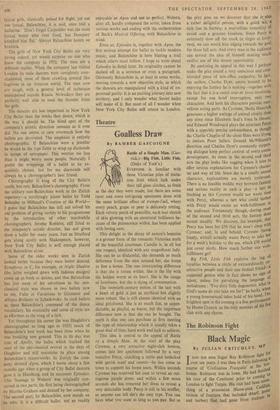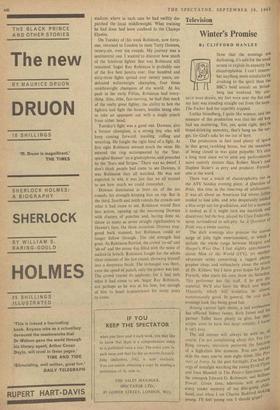The Robinson Fight
Black Magic
By JULIAN CRITCHLEY, P IHAD not seen Sugar Ray Robinson fight for over ten years. I was then in Paris following 3 course of 'Civilisation Francaise' at the Sor- bonne. Robinson was in town. He had finished his tour of the Continent prior to corning to London to fight Turpin. His visit had been some' thing of a procession (flame-pink Cadillac' retinue of fourteen that included dwarf, Jester and barber) that had gone from stadiunn to
stadium where in each case he had swiftly dis- patched the local middleweight. What training he had done had been confined to the Champs Elysees.
On Tuesday of this week Robinson, now forty- one, returned to London to meet Terry Downes, twenty-six, over ten rounds. My journey was a sentimental one. 1 wanted to discover how much of the fabulous fighter that was Robinson still remained. Sugar Ray Robinson is probably one of the five best boxers ever. One hundred and sixty-three fights spread over twenty years, un- defeated welterweight champion, four times middleweight champion of the world. At his peak in the early Fifties. Robinson. had every- thing. Slim, lithe, fast-moving, he had that mark of the really great fighter, the ability to box the fighters and fight the boxers, besides being able to take an opponent out with a single punch from either hand.
Tuesday's fight was a good one. Downes, also a former champion, is a strong boy who will keep coming forward, mauling, cuffing and wrestling. He fought the right kind of a fight. At first sight Robinson seemed much the same. He entered the ring accompanied by the 'Star- spangled Banner' on a gramophone, and preceded by the 'Stars and Stripes.' There was no dwarf. I don't think people had come to see Downes, it was Robinson they all watched. He was not expected to win, it was just that we all wanted to see how much we could remember.
Downes dominated at least six of the ten rounds, his strength keeping him on top. But in the third, fourth and tenth rounds the crowds saw what it had come to see. Robinson would flare into action, opening up the oncoming Downes with clusters of punches and, having done so, throw as many as seven straight righthanders to Downe's face. On three occasions Downes stag- gered back stunned, but Robinson could no longer follow through. The old strength had gone. As Robinson flurried, the crowd 'oo-ed' and `ah-ed' and the arena Was filled with the noise of sucked-in breath. Robinson fought for the whole three minutes of the last round, throwing himself
into a desperate finish. The technique was there, even the speed of punch, only the power was lost.
The crowd roared its applause, for it had seen what it had come to see. Sugar Ray Robinson, not perhaps as he was at his best, but enough of him to boast acquaintance for many years to come.



































 Previous page
Previous page